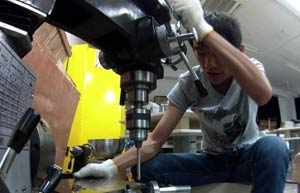GUANGZHOU - Hu Zhenyu, 21, founder of Link Space, China's first private rocket firm, does not want people to call him a "rocket scientist" but a rocket entrepreneur.
Rocket launches have traditionally been a state monopoly in China, but the young graduate from South China University of Technology plans bust the oligopoly with his first commercial launch in 2017.
On July 29 last year, Hu's team launched a rocket with a payload of 50 kg in North China's Inner Mongolia autonomous region. In January of this year, the company was registered in Shenzhen by Hu and two other men in their 20s: Yan Chengyi, a PhD candidate at Tsinghua University and Wu Xiaofei, a machinery manufacturing specialist. On Aug 5, they had a successful trial of a liquid-propellant rocket engine at a courtyard in a suburb of Gaoyou city in East China's Jiangsu province, Wu's hometown.
|
 |
 |
The focus of Link Space is a rocket designed to take measurements and perform scientific experiments during sub-orbital flight. The rocket will carry instruments to an altitude of up to 200 kilometers. It is very different from the kind of launch vehicle that carries heavy satellites into space.
The average price for launching such a commercial rocket is about 3 million yuan but Link Space intends to cut that price by a third.
"The domestic rocket market is worth tens of millions of yuan but will grow to hundreds of millions soon if we can provide more value," Hu said.
Hu is very familiar with SpaceX, California's commercial space venture founded by Elon Musk. "I admire Elon Musk but Link Space will never copy SpaceX or anybody else," he said.
SpaceX's Falcon 1 and Falcon 9 rockets had diameters of 1.7 meters and 3.5 meters respectively. "If our research goes smoothly, we plan to produce rockets with a diameter of 7 meters by 2020," said Hu.
But space is a costly business.
"Rockets need decades of technological accumulation and billions of yuan," said Luo Shu, chairman of KCSA, a non-governmental space enthusiast organization. He feels that time is not ripe for a Chinese SpaceX. The achievements of US private rocket firms are based on the long history of its space industry, not a sudden start-up fairytale, he said.
"China has no private space testing ground, so launch trials will be problematic," he added. Hu's team experiments in the Tsinghua University lab where Yan Chengyi works or the courtyard in Gaoyou city.
A 2011 white paper on China's space industry encouraged scientific and academic institutions as well as social groups to actively participate in the industry.
"Though we cannot catch up with the major State-owned players on technology in the short term, our presence will be a positive stimulus to the industry," Hu said.
